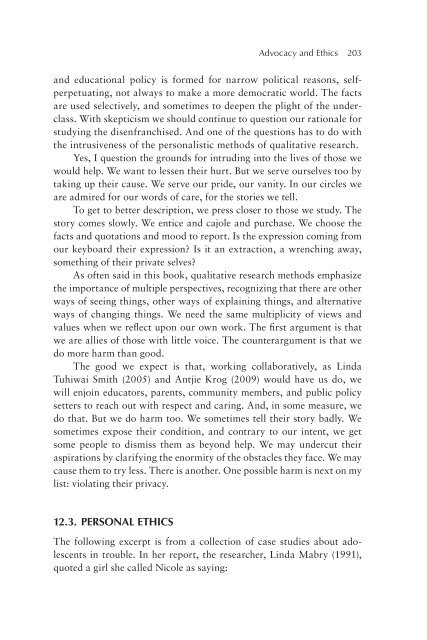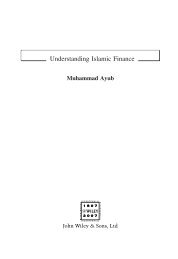How Things Work - Doha Academy of Tertiary Studies
How Things Work - Doha Academy of Tertiary Studies
How Things Work - Doha Academy of Tertiary Studies
Create successful ePaper yourself
Turn your PDF publications into a flip-book with our unique Google optimized e-Paper software.
advocacy and ethics 203<br />
and educational policy is formed for narrow political reasons, selfperpetuating,<br />
not always to make a more democratic world. The facts<br />
are used selectively, and sometimes to deepen the plight <strong>of</strong> the underclass.<br />
With skepticism we should continue to question our rationale for<br />
studying the disenfranchised. And one <strong>of</strong> the questions has to do with<br />
the intrusiveness <strong>of</strong> the personalistic methods <strong>of</strong> qualitative research.<br />
Yes, I question the grounds for intruding into the lives <strong>of</strong> those we<br />
would help. We want to lessen their hurt. But we serve ourselves too by<br />
taking up their cause. We serve our pride, our vanity. In our circles we<br />
are admired for our words <strong>of</strong> care, for the stories we tell.<br />
To get to better description, we press closer to those we study. The<br />
story comes slowly. We entice and cajole and purchase. We choose the<br />
facts and quotations and mood to report. Is the expression coming from<br />
our keyboard their expression? Is it an extraction, a wrenching away,<br />
something <strong>of</strong> their private selves?<br />
As <strong>of</strong>ten said in this book, qualitative research methods emphasize<br />
the importance <strong>of</strong> multiple perspectives, recognizing that there are other<br />
ways <strong>of</strong> seeing things, other ways <strong>of</strong> explaining things, and alternative<br />
ways <strong>of</strong> changing things. We need the same multiplicity <strong>of</strong> views and<br />
values when we reflect upon our own work. The first argument is that<br />
we are allies <strong>of</strong> those with little voice. The counterargument is that we<br />
do more harm than good.<br />
The good we expect is that, working collaboratively, as Linda<br />
Tuhiwai Smith (2005) and Antjie Krog (2009) would have us do, we<br />
will enjoin educators, parents, community members, and public policy<br />
setters to reach out with respect and caring. And, in some measure, we<br />
do that. But we do harm too. We sometimes tell their story badly. We<br />
sometimes expose their condition, and contrary to our intent, we get<br />
some people to dismiss them as beyond help. We may undercut their<br />
aspirations by clarifying the enormity <strong>of</strong> the obstacles they face. We may<br />
cause them to try less. There is another. One possible harm is next on my<br />
list: violating their privacy.<br />
12.3. PeRsONal ethics<br />
The following excerpt is from a collection <strong>of</strong> case studies about adolescents<br />
in trouble. In her report, the researcher, Linda Mabry (1991),<br />
quoted a girl she called Nicole as saying:

















